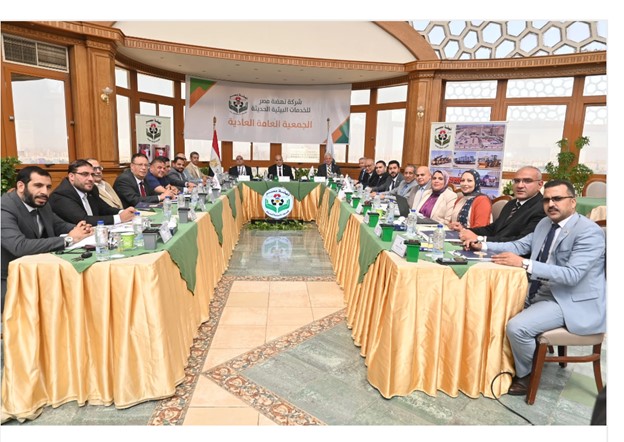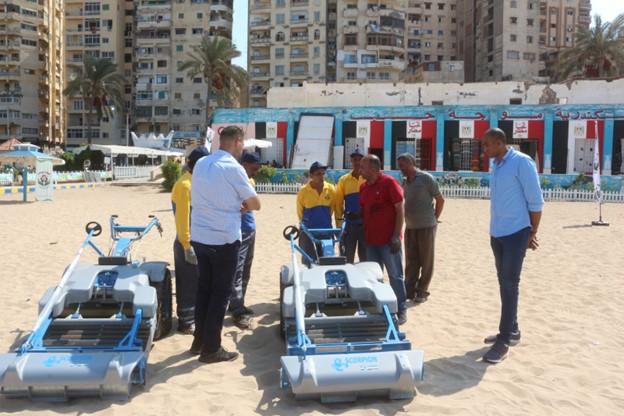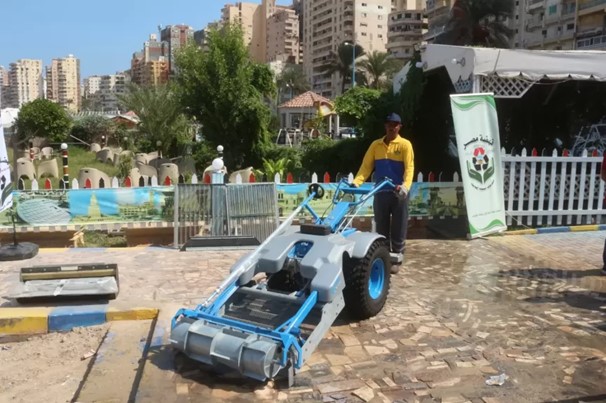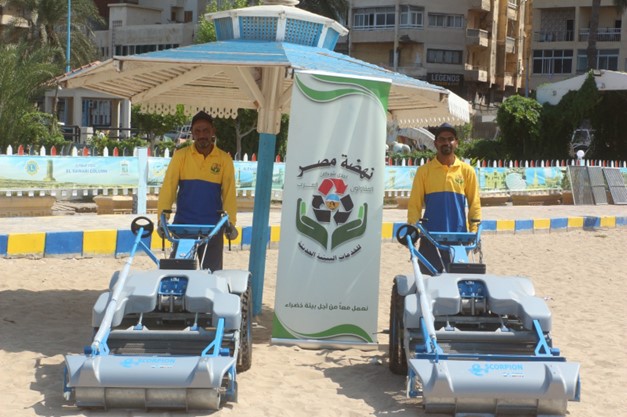
Introduction
AASTMT recognizes the growing global challenges arising from the excessive pressure on natural resources, escalating greenhouse gas emissions, rising sea levels, pollution, and inefficient waste management. These environmental issues threaten both present and future generations, underscoring the urgent need for responsible consumption and effective recycling practices. In alignment with its Environmental Change and Social Responsibility Policy, AASTMT is committed to advancing the Sustainable Development Goals by promoting a culture of sustainability across all its campuses and operations. The Consumption and Recycling Policy reflects this commitment by emphasizing waste reduction, resource efficiency, and responsible material use.
Through this policy, AASTMT aims to minimize environmental impact by prioritizing waste prevention, reusing materials whenever possible, and ensuring proper recycling and disposal in compliance with environmental regulations. By fostering awareness and sustainable habits within its community, the University seeks to create a cleaner, safer, and more resilient environment for future generations.
Scope
This policy applies to all AASTMT employees, students, and contractors who are involved in handling, managing, or storing any form of waste, including hazardous and non-hazardous materials. It establishes the framework for ensuring that all waste management activities prioritize recycling, reuse, and responsible disposal in line with the university’s sustainability objectives.
Recycling must be integrated at every stage of the waste management process—beginning with proper segregation and collection, followed by safe processing and reuse wherever feasible. A designated responsible person or unit shall oversee the recycling and disposal of materials to ensure compliance with environmental standards and the adoption of the most sustainable methods available.
By embedding recycling practices into daily operations, this policy aims to minimize environmental impact, promote resource efficiency, and support AASTMT’s broader commitment to sustainable development and environmental stewardship.
Aims of the Policy
The AASTMT policy considers end-of-life disposal costs and environmental impacts when making acquisition decisions involving the construction of new or renovated facilities.
AASTMT receives the 'waste order' of Prevention, reuse, reusing, and other recuperation and removal. AASTMT executes cycles, methods, and activities that guarantee consistency with ecological enactment and best practice, to lessen the general waste produced and forestall waste creation at every possible opportunity. Moreover, AASTMT is committed to measuring and weighing the amount of waste generated to track the waste and to find the best methods to reduce or recycle it.
Procedures
The Waste Treatment Progressive System and Stages Incorporates:
Prevention
Utilizing less material in the plan; keeping items for more; utilizing less unsafe material.
Reduce landfill waste and boost the usage of reusable, biodegradable, and recyclable materials.
Promote awareness and training programs to encourage responsible consumption and waste minimization across all departments.
RE-USE
Getting ready for re-use; cleaning; fixing, restoring.
Reduce the usage of single-use packaging. Reducing single-use packaging such as coffee cups and increasing the usage of reusable packaging
Recycle
Transforming waste disposal into another substance or item, including fertilizing the soil.
Anaerobic assimilation – transformation to biogas for power age; burning with energy recuperation.
Establish accessible recycling stations across campus and ensure regular collection and monitoring of recyclable materials.
Disposal
Reduce the disposal of items and send them by specialized to landfill to bury the hazardous materials.
Tracking the disposal items through a third party which evaluates the amount and the cost of the disposal items.
Ensure all disposal methods comply with environmental laws and safety standards to minimize ecological and health risks.
Ethical Sourcing of Food and Supplies
AASTMT is seeking to reduce food waste as much as we can through using food preservation methods and vermicomposting practices. The university is committed to delivering healthy food for all parties in the university including food on Campus, Residences, and employees whether vegetarian or others. AASTMT makes sure that the food is available at each level to guarantee healthy food for ASTMT’s stakeholders. However, food waste is still a problem for AASTMT. Therefore, AASTMT is applying the following procedures to use the waste of food in an appropriate way:
Develop a monitoring system for food donations by using food waste.
Most of the food waste produced is recorded and weighed to be sent to a device that produces bio-fertilizer for the green areas.
Some of the waste of food is used to feed the animals like (dogs, and cats,
Policy Statement
The AASTMT seeks to implement ethical and sustainable practices on all of its campuses. Therefore, the AASTMT has taken crucial measures to implement these practices, such as ecological practices and corporate social responsibility. Through the exchange of information within the Academy's supply chain, these food ethics and practices enable AASTMT to ensure the transparency of information about all suppliers.
Trusted suppliers
To accomplish supply chain transparency, one of the primary goals of AASTMT is to identify the most reliable and reputable partners who share the same ethical practices, objectives, and data. To accomplish ethical and sustainable practices, the first step is to identify the most suitable suppliers.
Secure Relationships
The interaction with suppliers is the second step to keep secure relationships between partners and to reduce the risk. AASTMT is seeking to build a platform and application to increase communication and share important information. That would give the suppliers and partners access to the internal systems they need based on their roles within the ecosystem, sustainability practices, and the food ethics of AASTMT.
Tracing the food supplies
Through utilizing new technologies such as block chain technology, AASTMT plays a crucial role in facilitating the monitoring and tracing of the origin of food. It allows the AASTMT to trace the origin of food and ensure its safe delivery to campuses.
Evaluation of the process
AASTMT is monitoring the overall processes between its partners to guarantee healthy and sustainable food for students, staff, and Residents. Based on this monitoring, errors must be fixed, and corrective action must be taken.
AASTMT guarantees that we are conforming to guidelines, enactment, and best practices to limit the danger of prompt and future contamination or mischief to wellbeing when completing operational exercises.
Actions
A proposition to build a Waste Management Centre throughout all AASTMT campuses to oversee every aspect of waste management within the Academy, and to recycle all type of materials generated.
AASTMT is about to build a packaging lab, this lab is aiming to act as a hub providing packaging services consultancy for Egyptian and research on the field of packaging supply chain. The materials of this lab will be extracted from cartoon and plastic waste from the AASTMT campus to produce packaging prototype designs.
AASTMT has halted the utilization of 'single use' plastics nearby utilizing a blend of elective materials and the suspension of deals of plastic filtered water nearby.
AASTMT perceives the unfavorable effect of plastic waste, from creation through to removal. Plastic contamination can destructively affect the marine climate, and the College is looking to diminish plastic use and wastage nearby. The accompanying activities have been received to advance this point with staff and understudies:
Single-use plastics in catering (food bundling, dispensable coffee cups, cutlery) have been supplanted with compostable catering supplies in all College food outlets, to lessen plastic waste nearby.
AASTMT intends to keep on diminishing waste by investigating new items and administrations which will help with accomplishing decreased plastics utilization and waste.
AASTMT will consider the hazardous materials that can be hurtful to the well-being or the climate. It incorporates irresistible organic/clinical waste, synthetics, solvents, pesticides, glaring light cylinders, refrigeration hardware containing ozone, non-eatable oils, batteries, asbestos, and paints. AASTMT will have an agreement with a third party to landfill these materials in a landfill area.
The AASTMT will oversee, so far as is sensibly practicable, all dangerous waste exercises fall under its influence in a way, for example, to limit the mischief to human wellbeing or the climate.
AASTMT will create and impart systems to empower workers to follow their “obligation of care” for the administration of risky wastes and screen these methods to guarantee consistency.
AASTMT will launch awareness and training programs for students, staff, and contractors to enhance understanding of sustainable waste management, recycling processes, and the safe handling of hazardous materials.
AASTMT will implement a digital waste tracking and reporting system to monitor waste generation, recycling rates, and disposal activities across all campuses, ensuring transparency, accountability, and continuous improvement in sustainability performance.
AASTMT will integrate Artificial Intelligence (AI) technologies into its waste management systems to optimize waste sorting, monitor recycling efficiency, and predict waste generation patterns for smarter and more sustainable decision-making.
Objectives:
Waste ought to be forestalled or limited at every possible opportunity. AASTMT empowers staff, Students, and employers to limit plastic and cartoon waste, in addition to increasing the awareness about the method to minimize disposable items.
Review Program
Document control | |
Policy title: | Consumption and Recycling Policy |
Date created: | May 2019 |
Approving body: | SDG workforce committee |
Version: | 5 |
Last review date | 2025 |
Next review date: | 2027 |
Policy owner: |
|
Lead contact: |
|
Approval Signature | Dean of Scientific Research and Innovation |

This shows AASTMT is extending its plastic-waste efforts beyond campus, linking with city-level environmental initiatives. This initiative is framed as a pioneering effort in marine conservation, targeting plastic pollution along the Alexandrian coastline. Nahdet Misr’s role is to provide the infrastructure, collection, and management of plastic waste, while AASTMT supports it under its environmental sustainability mission and SDG commitments.

This initiative is part of a broader waste-management strategy targeting coastal pollution and single-use plastics. The project was conducted under the framework of sustainable coastal cleanup and aligns with AASTMT’s environmental mission. By screening beach sand and collecting plastic waste, the initiative helps reduce marine litter and supports Egypt’s circular-economy efforts.



According to our recycling policy, AASTMT recycles “paper, plastic, and electronic waste” across campuses under its zero-waste strategy.
AASTMT aims to achieve a Zero-Waste Campus by 2049 and reduce total waste generation by 15% before 2030. To reach this goal, the academy is developing innovative waste-management solutions, including a smart recycling system that converts food waste and recyclables into valuable products. One key initiative is vermicomposting, which transforms organic waste into nutrient-rich compost. This method improves soil quality, reduces erosion, and cuts methane and CO₂ emissions. By expanding vermicomposting across its campuses, AASTMT supports sustainable agriculture and environmentally responsible waste practices.
In `oct 17, 2023 Students from the College of Fisheries and Aquaculture Technology participated in a recycling workshop, utilizing plastic and rubber waste to create models.
College of Fisheries and Aquaculture Technology-Alexandria | AASTMT
Students at the Arab Academy for Science, Technology and Maritime Transport launched a campaign called "It Will Come Back to You" to raise awareness about single-use plastic products and recycling, as part of Egypt's presidential "Go Green" initiative.
Campaign to collect plastic waste on AASTMT web page